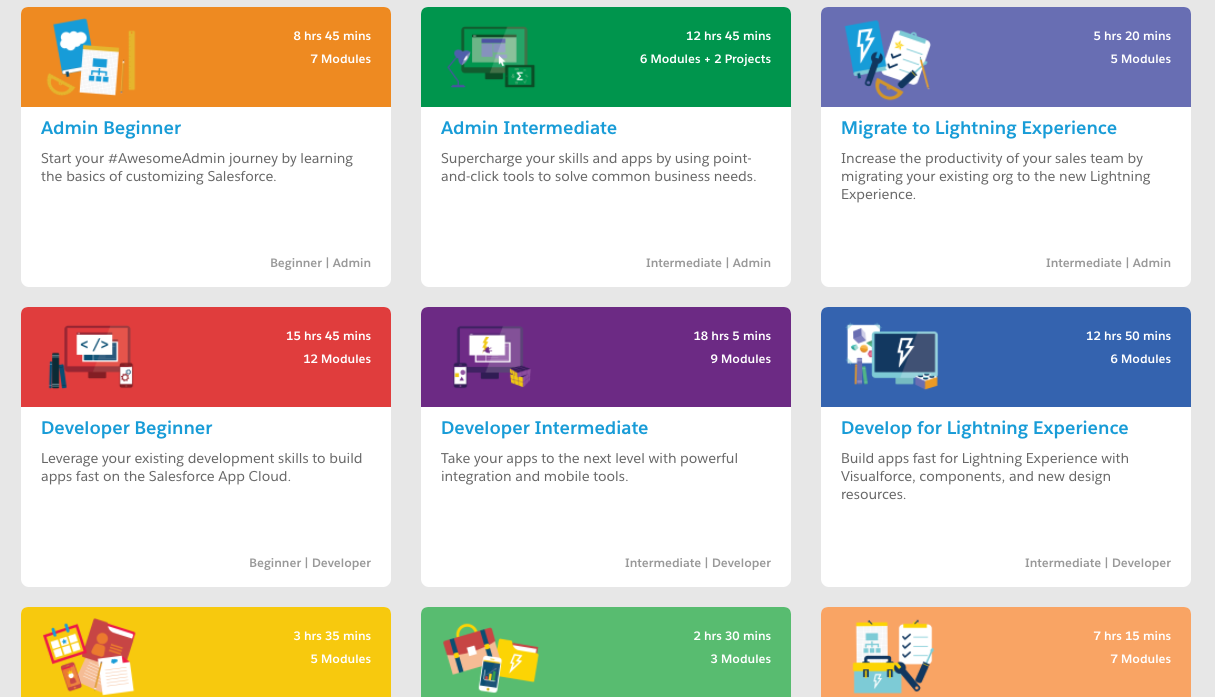By 2020, it’s estimated that more than 1.9 million jobs will be created around Salesforce. According to an IDC study commissioned by the cloud computing company, an additional 2.8 million jobs would be created in adjacencies, with $389 billion in new business revenue being generated just from cloud computing. Salesforce points to this as a reason for more people to start learning its suite of customer relationship management (CRM) products.
To encourage this, Salesforce created Trailhead, an educational program to help anyone get acquainted with and certified in the enterprise platform. Its long-term goal has been to “transform how customers learn to use Salesforce, by radically simplifying and redefining the learning experience.” After more than a year, the company reveals that 200,000 people are actively using the service, with 1.2 million badges earned.
“There are over 3 million people building apps on the Salesforce platform, but there’s a problem: You have limited resources, evangelists, and marketers. How do you educate developers at scale with a company that’s a fast innovator in all of the technologies coming out?” said Sarah Franklin, Salesforce’s senior vice president of developer relations and the general manager of Trailhead.
But just setting up an educational program wasn’t enough — everyone’s time is precious and they may not always be able to read through extensive course literature. Franklin said that the “secret sauce” behind the growth of the program is its ability to teach people what they need in an “engaging and fun tone” while offering hands-on challenges for what they need to learn. So beyond the basic learning, there’s a section for users to do some development work and receive feedback to ensure that they’ve coded it correctly.
Building around the CRM platform is something traditionally serviced by developers, but Trailhead opens this up to business users, marketers, those seeking a career change, and even children. The program is about developing more than just technical proficiency — it also teaches so-called “soft skills,” such as how to conduct interviews, give feedback to peers, and establish equality in the workplace (something very near and dear to Salesforce).
Salesforce recognizes that its platform has become practically indispensable for its customers and believes that it’s on the same level in the enterprise as Google, Apple, and Microsoft are in the consumer space. And developers aren’t the only ones to come up with new services for Salesforce, since the end users are the people who are likely to encounter problems that need to be solved. However, how do you reach the next logical step and have that end user create an app that integrates with the CRM platform? This is Trailhead’s objective.
This isn’t the first educational push the company has made — it already has learning courses available with some massive open online courses (MOOC) companies. However, Salesforce opted to create a new program this time around. “We explored a lot of partnerships, spent a lot of time with [Udacity chief executive] Sebastian Thrun, along with Coursera, PluralSight, etc,” Franklin remarked. “What was interesting was that people would consume some learning, but not receive hands-on experience. If you talk to a recruiter and ask what’s the most valuable thing [for applicants to have], it’s on-the-job experience.”
“Sitting and watching a video isn’t learning,” she continued. “Getting hands on and doing makes a difference.”
The program’s 200,000 “trailblazers” (what Salesforce calls participants) are quite active, having earned more than 1.2 million badges. Badges can be thought of as similar to awards you earn in the Boy Scouts and Girl Scouts — hence the outdoor tie-in. This number caught Franklin and her team off guard; their initial goal was to have 100,000 badges a year following the launch, but that number took off. Salesforce declined to provide specific demographics of Trailhead’s users, except to say that 60 percent of them are from the U.S.
She believes its appeal has to do with it being a community of learning, where not only do users take courses, but they’re also mentoring and offering apprenticeships to one another. However, finding ways to have the program scale is another problem, as Salesforce was unprepared for how voracious of an appetite trailblazers had, which is how tiered badges came about. Users advance from beginner to advanced levels, with each one featuring content of various degrees of technical difficulty and prerequisites that must be met. In some cases, there are projects that users need to complete within a few weeks with little guidance provided, and there are rewards for solving the problem correctly the first time.
But it’s the bite-size lesson plans that play a factor in bringing people back, offering content in a consumable manner that’s available on the phone, desktop, and tablet. Behind the scenes there’s a games mechanic that encourages you to press on with your education, taking quick tutorials when you’re on a train, before a meeting, or any other time so you don’t feel it’s a daunting task.
“People take enterprise software too seriously,” Franklin proclaimed. “At the end of the day, people want to have fun, earn points and medals, share their accomplishments on social media, and decorate their resume [with earned badges].”
Trailhead primarily features courses around how to master its product, either from a developer perspective or an administrator. There are also “trails” that are focused on users, such as how to leverage Salesforce to improve customer service, understand analytics, bring equality in the workplace, prepare for your MBA graduate degree, apply .NET programming skills to Salesforce, volunteer for nonprofits, build better user experiences, use Marketing Cloud, and even figure out Salesforce Einstein.
“We’re definitely focused on rounding out the skill sets that lead to the jobs that are being created in the Salesforce economy,” Franklin told us. “We’re really focused as a company on making a difference. We want to help people take courses that lead to jobs.” She acknowledged that the company was looking at courses around hobbies such as photography, but no firm plans have been made.
There have also been thoughts around enabling customers to create their own Trailhead content, which could benefit employees by enabling them to learn new skills or help their customers learn. Franklin shared that more levels are coming, including fun ones similar to what you’d find in Pokémon Go.
After Dreamforce, Salesforce said it will be releasing an update to Trailhead that Franklin says will improve user profiles, claiming that it will reinvent the resume: “Nothing from your resume can tell people how effective you are on the job. A reinvented resume in the digital economy to tell how well you do your job can be like a digital fingerprint, making your business resume become very powerful because employers can find the right talent, people can find the right jobs, and everyone is happier.”
She shared her experience as a mother, worried about what her kids wanted to be when they grew up and how people today are choosing career paths with coaches. Trailhead could be that deciding factor for young adults that could define what they elect to do with their lives, showing them what skills are needed and connecting them with employers that offer apprenticeships.
This year’s Dreamforce conference will be a celebration of the Trailhead program, where Salesforce not only showcases its latest products and services to its customers, but showcases its capabilities to new groups, including students, trailblazers, and more. The objective is to highlight the program’s inclusivity, something that fascinates Franklin as she’s seen a dynamic range of users, including executives, new users, digital marketers, and more.
“This is a perfect opportunity to help people,” she said.






